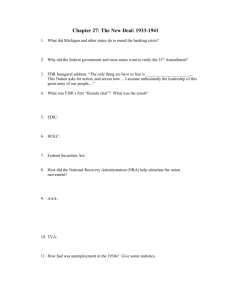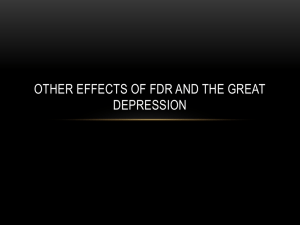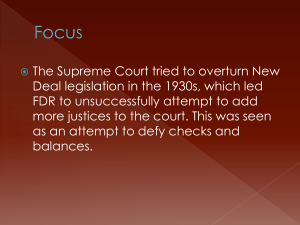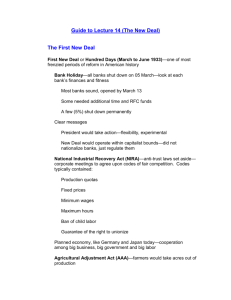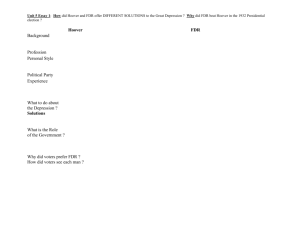POWER POINT--FDR & THE NEW DEAL
advertisement
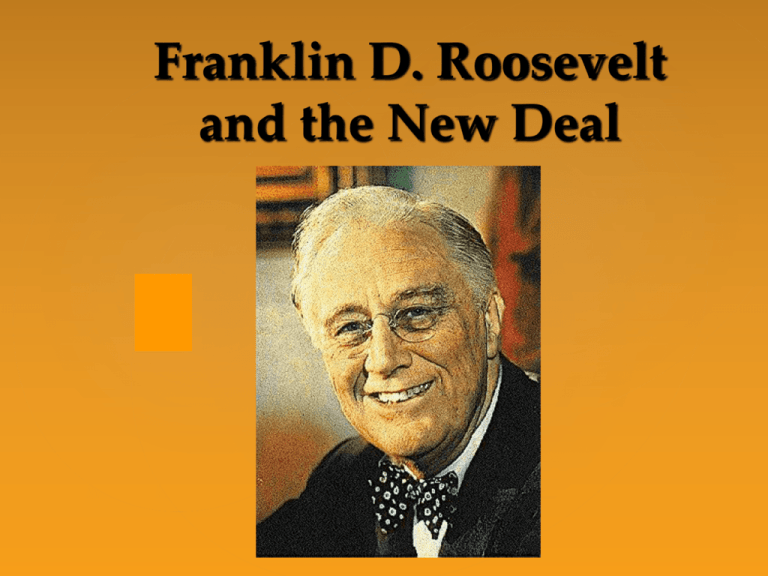
Franklin D. Roosevelt
and the New Deal
{
CONGRESS
GETS BUSY
FDR’s philosophy: get people
help & work through
“deficit” spending
During the famous “100 Days”
(March--June 1933), Congress
passed 15 major laws (the New Deal)
Purposes of the New Deal
The Three Rs
Relief: provide
immediate help to the
desperate
Recovery: provide
jobs & get the economy
going
Reform: prevent
future depressions
Immediately declares
4-day bank holiday
Created the Federal Deposit
Insurance Corporation (FDIC)
Insured account holders up
to $5,000
(today up to $250,000)
ALPHABET SOUP AGENCIES
CCC – Civilian
Conservation Corps
3 million men ages 18-25
worked building roads,
parks, planting trees
Paid $30/month; $22 went to
the family
CCC
Civilian Conservation Corps
National Recovery Administration (NRA)
FDR believed Depression was
caused by too much cutthroat
competition
Created partnership of
business, labor & government
to set prices, wages, work
hours
Businesses who participated
got to fly Blue Eagle flag
Huge government involvment
in the economy
ROOSEVELT’S
FIRESIDE CHATS
FDR communicated to
Americans via radio
His frequent talks
explained to
Americans what he
was doing
ALPHABET SOUP AGENCIES
FERA – Federal
Emergency
Relief Agency—
$500 million in direct
relief (food &
clothes) to the
neediest Americans
Citizens wait outside a FERA in
Calipatria, CA for relief checks
The Tennessee Valley Authority (TVA)
Huge government
program to provide
work building dams
Provided flood control,
electricity & irrigation
Copyright 2000, Bedford/St. Martin’s
Agricultural Adjustment Act (AAA)
Goal: Raise crop prices
for farmers
•
Paid farmers who
reduced production of
basic crops such as
wheat, corn
•
In first year 2 million
cows & 6 million pigs
destroyed
Securities & Exchange
Commission (SEC)
Created in 1934 to regulate trading practices in
stocks and bonds
CRITICS EMERGE
Liberals-- FDR’s NOT doing
enough!
Conservatives—FDR’s doing
TOO much and interfering
with free market economy
Criticisms of Conservative Opponents
•
•
•
•
New Deal = socialism (killed
individualism)
Added to national debt ($35
billion)
Wasted money
FDR reaching toward dictatorship
American Liberty League Forms
This conservative
organization had $
but was small in
numbers
Father Charles Coughlin
Every Sunday Coughlin broadcast
radio sermons slamming FDR
He called for a guaranteed annual
income and nationalized banks
45 million listeners
Increasingly anti-Semitic remarks
cost him support
Dr. Francis E. Townsend
•
•
•
•
Elderly doctor from CA.
Wanted government to
pay $200/month to
people over 60.
Each pensioner would
have to spend the $ in 30
days.
Would be paid for by a
2% national sales tax
Senator Huey Long (LA)
Long said New Deal measures
were “mere crumbs” and
advocated a share the wealth plan
---a guaranteed annual income
of $5,000 for every American
---to be paid for by taking wealth
of people who made over $1
million per year)
The Second New Deal (1935-36)
•
•
Many were still out of work
FDR took still more action
Works Progress
Administration (WPA)
•
Biggest New Deal agency;
employed 8 million
•
WPA workers built 850
airports, 651,000 miles of
roads and streets, 125,000
public buildings, reservoirs,
irrigation, sewage, schools,
playgrounds
Also hired artists, writers,
musicians, photographers to
create art
•
The Davis Street School Extension in
Atlanta under construction as part of the
Works Progress Administration Program,
November 2, 1936
Federal Theatre Project
WPA Murals
Tam Mural
WPA Murals In SF
San Geronimo mural
The W.P.A. at Work
REA
Rural Electrification Administration 1935
SUPREME COURT
REACTS 1935
The Supreme Court -- 1935
•
Struck down NRA as
unconstitutional (too
much govt control over
industry)
•
Also killed AAA (said
agricultural was a local
not a federal matter)
Wagner Act
Guaranteed unions right to
organize & bargain collectively
Established National Labor
Relations Board to mediate
disputes
SOCIAL SECURITY ACT
Pensions for those over 65
Paid for by tax out of
people’s paycheck (payroll
tax)
Unemployment
compensation
Aid to families with
dependent children &
disabled (1st direct welfare
program)
Soak the Rich”Act of 1935
•
•
Response to Huey Long
Increased taxes on large incomes &
corporations.
Second Agricultural
Adjustment Act
Educated farmers how
to use land without
damaging it
Paid farmers to follow
conservation practices
FDR WINS
AGAIN IN 1936
Wide appeal, especially
in urban areas
Blacks, Jews, Catholics,
immigrants all
supported the popular
president
FDR & Eleanor campaign by
rail in 1936
Court-Packing Plan
FDR frustrated w/Court’s
conservative members
Proposed increasing Court
from 9 to 15 members, so he
could appoint supporters
Even fellow Democrats
outraged
Court packing plan cartoon here
Fair Labor Standards Act (1938)
• Set minimum wage & maximum
40-hour work week
THE IMPACT OF THE NEW DEAL
Opinions range from harsh
criticism to high praise –
usually along partisan lines
Conservatives feel FDR made
government too large &
powerful
Liberals feel govt intervention
was necessary and effective
LEGACIES OF THE NEW
DEAL
FDIC – banking insurance
critical to sound economy
Deficit spending has
became a normal feature of
government
Social Security is a key
legacy of the New Deal in
that the Feds have assumed
a greater responsibility for
the social welfare of citizens
since 1935
